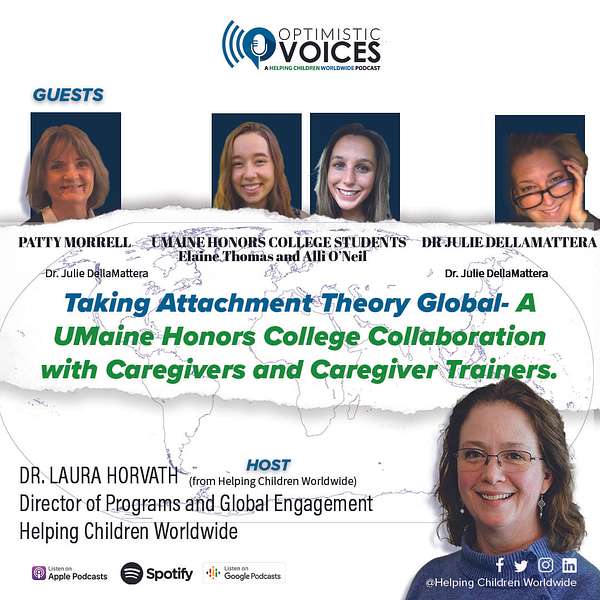
Optimistic Voices
Vital voices in the fields of global health, global child welfare reform and family separation, and those intent on conducting ethical missions in low resource communities and developing nations. Join our hosts as they engage in conversations with diverse guests from across the globe, sharing optimistic views, experiences, and suggestions for better and best practices as they discuss these difficult topics.
Optimistic Voices
Taking Attachment Theory Global- A UMaine Honors College Collaboration with Caregivers and Caregiver Trainers.
Host Dr. Laura Horvath interviews the team behind the Attachment Theory Workshops being introduced as a means of bringing the lessons of Trauma-Informed care into low resource environments for social workers who work with primary caregivers taking on the challenges of accepting children into their homes to raise.
We’re really excited to introduce you to the guests on our panel today. They’re all in some way connected to the University of Maine’s Honors College, and working collaboratively with social workers on the ground in various parts of the global south, they’ve developed a tool to help caregivers heal the trauma of separation for themselves and their children, and learn how to form strong and healthy attachments with them. Even in places where the caregivers themselves are not literate. Patty Morell, an alumna of UMaine, was one of the first to even conceive of what we now call the Attachment Theory Workshop. Patty and her husband, Allen, have been active alumni, and have always looked for ways to engage energetic, altruistic college students from their University in meaningful ways to make a difference in local and international projects and programs. Elaine Thomas is a senior in the UMaine Honors College studying Business Management, Alli O’Neil is a Social Worker, who began with the AT team during her undergraduate study at the UMaine. And finally, Dr. Julie DellaMattera is a professor of early Childhood Development and Education at UMaine.
Trauma-informed care (TIC) is critical in institutional settings to address not only the trauma of experiences that lead children to be enrolled into alternative care such as child care institutions (CCI), but also the inherent trauma that comes from a child being separated from her or his family. It’s a critical consideration when orphanages transition from residential to family care models as well. It’s critical that any reintegration plan moving children from separation (in institutional settings or living on the street) back to families. Orgs engaged in reintegration must apply principles of trauma-informed care at every stage: from intake and care at a CCI while awaiting placement, to preparing children and families for transition, and finally to monitoring and supporting post-placement.
According to our panelist: It was a total surprise for them to attend the Christian Alliance for Orphans annual summit a few years ago to present the concepts of the work they were doing alongside Helping Children Worldwide and to discover the overwhelming interest. From there, the number of organizations asking for support of this kind has grown exponentially. "We didn’t realize we had created something new, something that didn’t exist. ...a culturally competent attachment theory workshop designed specifically for non-literate caregivers. With the shift to rehome children internationally, agencies and NGOs have been looking for something that can support and strengthen families."
UMaine: https://umaine.edu/
Honors College: https://honors.umaine.edu/
Article About Trip to Sierra Leone (Minerva Magazine - see pages 8 through 13):
https://digitalcommons.library.umaine.edu/cgi/viewcontent.cgi?article=1018&context=minerva
Video About Trip to Sierra Leone: https://www.youtube.com/watch?v=MheEwebrdbc
Helping Hai
Helpingchildrenworldwide.org

Dr. Laura Horvath
Host
Dr. Melody Curtiss Cathey
Host
Emmanuel M. Nabieu
HostYasmine Vaughan
Host
Elana Childress
Co-hostNatalie Turner
Co-hostPodcasts we love
Check out these other fine podcasts recommended by us, not an algorithm.

Think Global, Do Justice
Canopy International